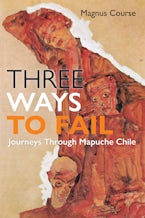An ethnographic exploration of anthropological failure through the Mapuche archetypes of witch, clown, and usurper
How do we learn what failure looks like? During the years anthropologist Magnus Course spent living with Indigenous Mapuche people in southern Chile, he came to understand failure—both his own and those of the discipline of anthropology—through Mapuche narratives of the witch, the clown, and the usurper. In a context of enduring poverty and racism, increasing state repression, and his own disintegration, he began to realize that these figures of failure, and their insatiable appetites for destruction, greed, and property, reflected as much upon his own failings as on anybody else’s, but also showed the way forward to a better way to live.
Set amidst the stunning natural beauty and political tragedies of southern Chile, Three Ways to Fail is the story of what it means to become a part of other people’s lives, of what it means to fail them, and of what it means to live well when everything falls apart. Grounded in three decades of work and collaboration with Mapuche people, Three Ways to Fail sheds new light on Indigenous lifeways in the Americas while grappling with broader questions about the nature of ethnographic writing and the future of anthropology.











